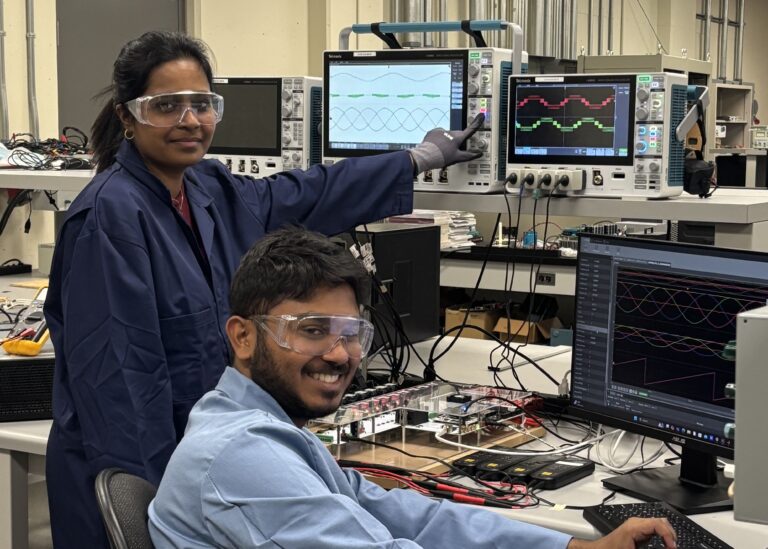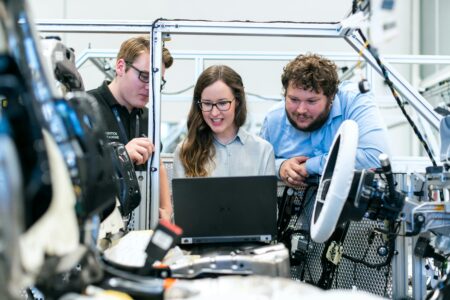
Electrical and Computer Engineering (ECE) is the backbone of modern technology. From improving communication networks to creating smarter devices, ECE professionals are the driving force behind innovation.
Think about the rapid advancements in electric vehicles (EVs). ECE is key in designing efficient battery systems and the software that powers them. Or consider the rise of AI — it’s ECE that enables the hardware and algorithms to work together seamlessly. Whether it’s through designing faster processors or building systems for renewable energy, ECE touches almost every aspect of our lives.
With new challenges emerging, like 5G deployment and quantum computing, the field continues to evolve, offering endless opportunities for those who understand the pulse of technology.
While many universities offer degrees in these fields, only a few focus on research. If that’s something you’re looking for alongside a robust graduate programme, then consider these three universities that have programmes investigating, studying, and taking on some of the field’s greatest challenges:

The University of Alberta offers hands-on experience in cutting-edge labs with instruction from award-winning faculty. Source: University of Alberta
University of Alberta
Engineering is one of the most sought-after professions worldwide, and Alberta, Canada, is a thriving hub for opportunities — especially in electrical and computer engineering. Many of these roles are filled by graduates from the Department of Electrical and Computer Engineering (ECE) at the University of Alberta (U of A), Canada’s fifth-largest university and ranked among the top 100 in the world.
ECE offers several graduate programmes, including the course-based Master of Engineering (MEng), and the funded thesis-based Master of Science (MSc) and Doctor of Philosophy (PhD). Students enrolled in any of these programmes will benefit from the department’s strong industry links, cutting-edge interdisciplinary research in the areas of quantum/nanotechnology, artificial intelligence, power/energy systems, photonics, and biomedical, and financial support for thesis-based studies.
Such opportunities build on a long tradition of excellence. For nearly a century, ECE students and researchers have been shaping the future. They are behind the sonar technology used during World War I and advancements in nanotechnology, artificial intelligence, and quantum engineering today. Graduate students are central to this work, gaining experience as researchers and teaching assistants that prepares them for careers in academia, public research, or industry.
U of A ECE students can fully focus on their programmes and careers thanks to the university’s location in Edmonton. Edmonton is home to over one million people and Alberta’s capital, with a vibrant start-up and technology ecosystem and federal and provincial government offices. The city offers the amenities of a large urban centre while maintaining a friendly atmosphere. As one of Canada’s most affordable cities, Edmonton has a reasonable cost of living and diverse and affordable housing options as well. Considering its competitive tuition costs, graduate students here will have a strong return on investment for their master’s and PhD degrees.
For anyone looking to impact the world of technology, the graduate programmes in ECE at U of A offer the tools, support, and opportunities to succeed. It’s a place where big dreams turn into real-world innovations. Learn more about U of A.

Through the I2I courses and other track-specific courses, students will also develop project definition, project management and writing/presentation skills which are highly valued in industry. Source: Purdue University
Purdue University
Purdue University, consistently ranked among the top 10 public universities in the US, boasts a reputation for academic excellence and large-scale impact. With two colleges ranking in the top four nationally and graduating the fifth most STEM majors among its peers, Purdue offers an effective learning environment that emphasises real-world application and industry collaboration.
At the heart of this is the Elmore Family School of Electrical and Computer Engineering (ECE), the largest academic unit at Purdue and the nation’s premier ECE department. Their innovative Project-Track Master’s Programme bridges the gap between theory and practice, preparing students for success in industry or further research.
This programme revolves around the Ideas to Innovation (I2I) Project, a two-semester experience where students tackle challenges proposed by industry partners and Purdue faculty. Working in diverse teams, they gain valuable expertise in areas such as software, circuit design, and power while honing their technical, product development, project management, and professional skills. Company mentors and Purdue faculty guide student teams every step of the way.
Students can design their path with one-credit courses covering cutting-edge topics like advanced lithography, quantum computing, and more, building depth and breadth in their area of interest. As they advance their knowledge in these fields, they enhance their resumes with strong teamwork, communication, and project management skills. They can even earn a prestigious concentration in Microelectronics and Advanced Semiconductors alongside their master’s degree.
Travel grants valued up to US$1,000 to attend conferences and expos open doors to connect with potential collaborators, sponsors, and employers. Meanwhile, Purdue’s career services and extensive alumni network offer guidance and connections for landing students’ dream jobs.

The Chandra Family Department of Electrical and Computer Engineering, boasting over 2,500 students and 80 faculty members, is the largest department within the Cockrell School of Engineering. Source: The University of Texas at Austin
University of Texas at Austin
Right in the heart of Austin sits the University of Texas. It is the largest and most comprehensive university in North Texas and offers an array of undergraduate and postgraduate programmes in engineering.
The Chandra Family Department of Electrical and Computer Engineering is the university’s most prominent department within the Cockrell School of Engineering. Home to more than 2,500 students and 80 faculty, the department is renowned for its state-of-the-art research, development and design experience.
The four-semester MS in Engineering degree has eight academic tracks: Architecture, Computer Systems, and Embedded Systems (ACSES); bioECE; Decision, Information, and Communications Engineering (DICE); Electromagnetics & Acoustics (EA); Electronics, Photonics and Quantum Systems (EPQS); Integrated Circuits & Systems (ICS); Power Electronics and Power Systems (PEPS) and Software Engineering and Systems (SES). Students can make full use of the various resources and interdisciplinary work at UT Austin as well.
Upon completion, they can progress to the PhD — a route that’s led Yifan Jiang to become a recipient of a 2023 Apple Scholars in AI/ML PhD fellowship. He will receive funding as he pursues his PhD, internship opportunities, and mentorship with an Apple researcher in their field.
*Some of the institutions featured in this article are commercial partners of Study International










